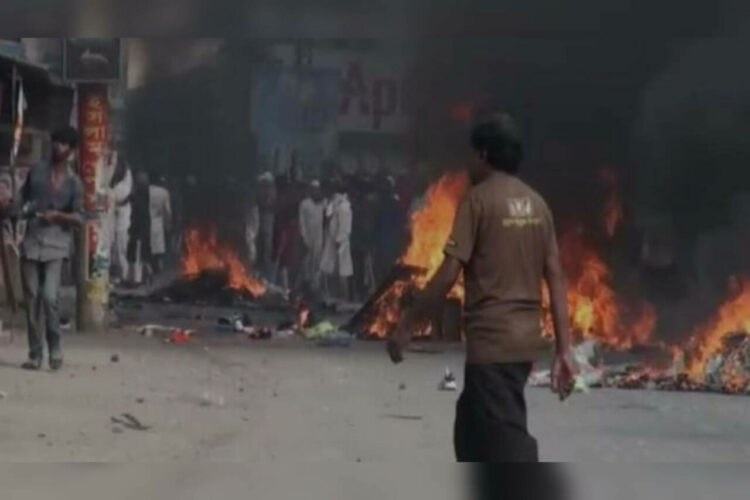On March 3, people belonging to the Ahmaddiya community living in the Northern District of Bangladesh, Panchagarh were observing their annual religious gathering ‘Jalsa Salana’. Soon the gathering became a massive protest site after local Sunni protesters attacked them. The Jalsa which was supposed to be a three-day event witnessed arson and vandalism on its very first day.
The local police administration claimed that the situation was taken to control by the evening. While speaking to the media the District Superintendent of Police, SM Sirajul Huda said, the police teams have been trying to control the situation.
However, houses belonging to the Ahmadiyyas were vandalized by the attackers irrespective of the security measures. As per the reports, 17 platoons of the Border Guard Bangladesh (BGB) were deployed in the area citing the intensity of the attack.
On March 2, several organizations called for protests demanding the Jalsa to be cancelled; they blocked the Dhaka-Panchagarh highway and disrupted the traffic of the city.
On 3 March, the first of the Jalsa was observed. Heavy security personnel were deployed following the outrage. As soon as the procession was taken out they were attacked by the protestors.
The Police
A police official as quoted by IANS, Latif Miah said, “The protestors went to the city’s Takkamara area and set fire to the traffic police office. The police and BGB vehicles were also damaged in the attack. The police fired a few tear gas shells to bring the situation under control”.
The protests spread like wildfire and the situation remained out of control. By the evening various houses of the minority Ahmadiyya community were set ablaze. The attacker vandalized and looted their shops. They also burnt tyres on the streets.
One killed in the attack
In the act of arson a 28-year-old man identified as Arifur Rehman was killed amid clashes between the police and the militants. Rehman was the owner of a printing press in the city and his family told the media that he was returning from the Mosque when he was attacked.
As many as fifty people sustained severe wounds in the crosshair whereas nine policemen were also attacked. The police teams arrested many accused in relation to the attacks.
Why are Ahmadiyyas considered Non-Muslims by the orthodox Muslims living in Islamic countries?
Ahmadiyya (an Islamic sect) consider Mirza Ghulam Ahmed, their founder as a kind of Prophet. Notably, Ahmed came after Muhammad, whom Sunni Muslims consider the last Prophet. His claims and revelations landed him into great trouble and his followers are facing it to date.
The rise of the Ahmadiyya movement and Ahmed in general dates back to 1836 and the movement lasted till 1906. Thousands of his believers find his theory of the ‘Promised Messiah’ true and that is why they are being opposed by the orthodox Muslims.
Ahmed in 1891 claimed that he is a—Prophet, a revivalist (mujaddid) and the promised messiah (mahdi) anticipated by the Muslims. He gained thousands of followers in this period and his death split the movement into two. The first who believed he is a messiah and the others who consider him as a reformer but adhere to the common practices of Islam and follow Muhammad.
It is noteworthy that the Sunnis and Shias living in Islamic countries do not consider Ahmadiyya as Muslims. In fact they are marginalised, discriminated and even violently oppressed by the majority of Mohammedians.
For instance, After decades of struggle, the Ahmadiyyas are still considered as the Non-Muslim minority as per the Pakistani law passed in 1974. A law even barred an Ahmadi from holding the office of the President in 1973.
These rules have forced Pakistani police to destroy Ahmadi copies of the Quran and related commentaries, restrict Ahmadis from writing their confession of faith (kalma) on their gravestones, stop them from building mosques, and even restrict them from using the term “masjid” (or & “mosque”) to refer to their place of worship. The same is the case in Bangladesh, as the minority Ahmadiyyas are struggling to find a place among Islamists.
Violence against Ahmadi Muslims has also been rampant throughout the world since their founder Ahmed claimed to be a ‘Promised Messiah’.
There are a number of reasons for these protests but the first and foremost being Ahmed calling him ‘Prophet’ which is against the orthodox Islamic tenet who consider Muhammad as their last founder.




















Comments